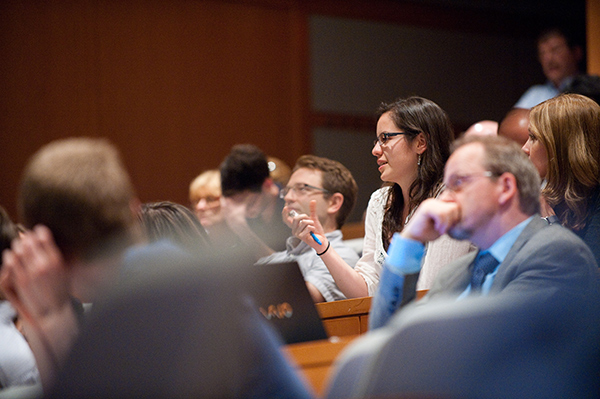What would life be like without engineers?
“Without engineers, we humans would be naked and sitting in the dirt!”
This bit of deliberate hyperbole illustrates the basic message of this year’s Hall Lecture, delivered on Tuesday by Norman Fortenberry, executive director of the American Society for Engineering Education and an acknowledged leader in engineering education.
In his talk titled “Engineering Excitement,” Fortenberry outlined the changes in U.S. engineering education that he believes are necessary for the profession to adapt to the economic and social changes that are currently sweeping the globe.
At the beginning of his lecture, he ran a promotional video clip produced by Southern Methodist University’s Lyle School of Engineering titled “What’s the Big Idea?” The purpose of the clip is to rebrand engineers as creators, explorers, change agents, problem solvers, leaders and visionaries who deal in big ideas.

This provided a colorful introduction to one of Fortenberry’s key points: “engineering is too important to be restricted only to engineers.” Given the extent to which modern society is dependent on all manner of technologies, it is crucial that government officials, politicians, businessmen, school teachers and the public at large are given a big dose of engineering literacy, he argued.
To achieve this goal, universities should recategorize engineering as a “liberal art” and add engineering survey courses designed for non-majors as a general requirement, he urged. These courses would provide English, poli sci, history and premed majors with a broad overview of the basic principles that engineers use as well as the importance of their contributions to society.
Similarly, Fortenberry called for a significant improvement in the way that engineering is taught to students in grades K-12. Engineering is included in the National Academy of Science’s “Framework for K-12 Science Education” which will be widely implemented in the nation’s schools over the next few years, but he expressed concern that very few engineers are involved in the current implementation stage. “Our colleagues, the scientists, are very nice people but they aren’t engineers and I’m afraid they won’t get it right,” he said.
This is particularly important because engineering literacy is complimentary to science literacy. “When you ask a young student to learn a new scientific principle, they often ask, ‘Why should I? What value is it?’ Well, engineering can provide the answer by showing how the principle can be applied in the real world,” he pointed out.
Emphasizing the field’s relevance to solving real world problems is also the best way to recruit the next generation of U.S. engineers, Fortenberry said. It allows engineering schools to tap the same idealism that leads many students to go into medical careers.
In the past, the U.S. has benefited from an influx of foreign-born engineering and science students. Today foreign students make up about half of all the engineering and science graduate students in U.S. universities. After they graduate about two thirds of these students remain in the country. But the nation cannot count on this situation to continue. In the last few years enrollment of new foreign graduate students has been dropping and experts predict that this trend will continue as opportunities expand in India, China and man other developing countries. So interesting more native-born students in engineering is critical to maintaining the nation’s economic competitiveness.

“Instead of emphasizing the salaries that our students can make, we need to emphasize what students will be able to do,” Fortenberry said.
Today, the image of the lone inventor is obsolete, he pointed out. These days, invention and innovation are almost always the product of research teams. As a result, social skills like the ability to communicate, work with others and adapt to changing conditions are more important than ever and engineering schools should be explicitly teaching them.
What the current times demand are “Renaissance” engineers. These are individuals who can analyze a problem, identify the specific skills required to address it and put together a team of experts capable of solving it, he urged. If U.S. engineering schools can retune their operations to produce such “meta-engineers” it will give the country a 10-15 year lead over its competitors, Fortenberry said.
Who knows, if the rebranding effort Fortenberry is pushing is successful, engineers may become cool and Hollywood may begin including starring roles for engineers in their productions. LA Engineering, any one?
Fortenberry’s lecture is part of the School of Engineering’s 125th anniversary celebration.